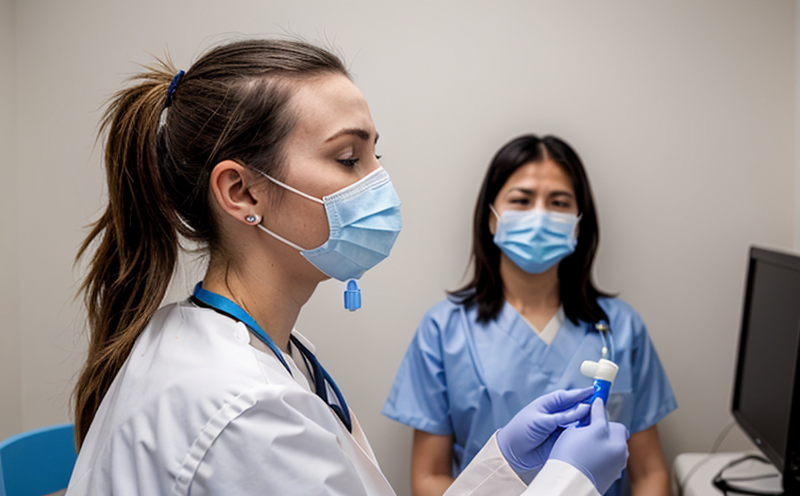Respiratory Viral Screening in Aquatic Mammals
In aquatic mammals, such as dolphins, seals, and sea otters, respiratory viral infections can have severe impacts on their health. These animals are often exposed to a variety of pathogens due to environmental factors and close contact with humans or other species. The ability to screen for potential respiratory viruses is crucial in maintaining the well-being of these marine mammals.
Respiratory viral screening involves identifying the presence of specific viral agents that may be causing or contributing to respiratory issues. This process typically begins with collecting a sample, which can include nasal swabs, sputum, or bronchoalveolar lavage fluid from the respiratory tract. The samples are then analyzed using advanced molecular diagnostic techniques such as polymerase chain reaction (PCR) and next-generation sequencing.
The PCR method is particularly useful for detecting viral RNA or DNA, allowing for early diagnosis of infections before symptoms become severe. Next-generation sequencing provides comprehensive insights into the genetic makeup of the virus, which can be critical in understanding the spread of new strains or in monitoring emerging pathogens. The diagnostic process also includes bioinformatics analysis to interpret the sequence data accurately.
Once identified, the viral presence is reported to relevant authorities and institutions, ensuring timely intervention measures are taken. These interventions may include isolation protocols, treatment with antiviral medications, or supportive care aimed at preventing secondary bacterial infections. Additionally, monitoring of the affected population helps in understanding the prevalence and transmission dynamics within aquatic mammal communities.
The importance of such screening cannot be overstated, especially given the unique challenges faced by aquatic mammals. Their inability to cough effectively or perform other typical human respiratory actions complicates the diagnosis and treatment process. Early detection through viral screening can significantly enhance the effectiveness of health management strategies, ultimately contributing to the conservation efforts for these vulnerable species.
The laboratory adheres strictly to international standards such as ISO 15189, which ensures high-quality and reliable testing processes. By following stringent protocols and using state-of-the-art equipment, our lab aims to provide accurate results that can guide appropriate healthcare decisions.
Applied Standards
| Standard | Description |
|---|---|
| ISO 15189:2017 | International standard for quality and competence of medical laboratories, ensuring high standards in testing. |
| ASTM E2369-18 | American Society for Testing and Materials standard for the performance requirements for real-time reverse transcription polymerase chain reaction (rRT-PCR) instruments used in clinical laboratories. |
| EN ISO 17025:2017 | European Union harmonized standard for the general requirements for the competence of testing and calibration laboratories, providing assurance of laboratory quality. |
| IEC 62366-2019 | International Electrotechnical Commission standard for the safety assessment of medical devices used in clinical laboratories. |
Benefits
The ability to screen aquatic mammals for respiratory viruses offers several key benefits. Firstly, it enables early detection and intervention, which is critical in preventing the spread of infectious diseases within populations. Early treatment can significantly reduce mortality rates and improve overall survival chances.
Secondly, such screening supports conservation efforts by providing data that helps in understanding the health status and potential threats to aquatic mammal species. This information is invaluable for developing effective management plans aimed at protecting these animals from environmental stressors and human-induced diseases.
Thirdly, accurate diagnostic testing enhances the credibility of research projects focused on marine biology and ecology. By providing precise data on viral prevalence, our services contribute to a deeper understanding of the ecosystem dynamics in aquatic environments.
Lastly, compliance with international standards ensures that the results are reliable and universally accepted, fostering trust among stakeholders involved in animal health management and conservation initiatives.
Quality and Reliability Assurance
The laboratory maintains a rigorous quality assurance process to ensure that all tests conducted meet the highest standards of accuracy and reliability. This includes regular calibration of instruments, validation of test methods, and participation in proficiency testing programs.
We employ highly trained personnel who are experts in their fields, ensuring that each sample is handled with care and precision. Our state-of-the-art facilities are equipped with advanced technology to facilitate accurate and rapid testing, minimizing the time between sample collection and result reporting.
Compliance with international standards such as ISO 15189 further enhances our commitment to quality. This standard not only ensures that our laboratory meets strict performance criteria but also provides transparency in our processes, allowing us to maintain a high level of trust with our clients.
We continuously strive for improvement by staying updated on the latest advancements in diagnostic techniques and technologies. Our dedicated team works closely with industry leaders to incorporate new methods into our testing protocols, ensuring that we are at the forefront of respiratory viral screening for aquatic mammals.





